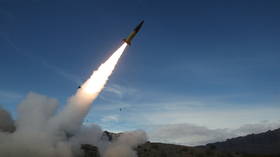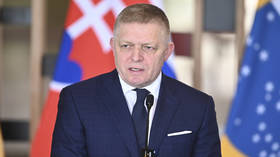Majority of Georgians back NATO membership
Although Georgia remains divided over the legitimacy of the recent presidential election, the country appears to be united on one thing – its desire to join NATO.
Seventy-seven per cent of the vote is a good result in any poll, but when the question is as crucial as 'do you want your country to join NATO' – it's a ringing endorsement.
The drive to bring the armed forces fully up to NATO standards was a top policy for Mikhail Saakashvili during his first term, and looks set to continue in his second.
“We are the first armed forces in the post-Soviet space to acquire western weapons and adopt western standards at such a pace. I could not even imagine that we would be able to do it. But we did it and we will do much more,” Saakashvili said.
Georgia's military has undergone huge reforms over the last four years. They've been trained by NATO instructors and kitted out with the latest, NATO-compatible equipment.
Georgian soldiers have served as peacekeepers in Afghanistan and Kosovo, and 2,000 of them on duty in Iraq. They are the third largest foreign contingent there.
Aleksandr Sharavin, director of theInstitute of Military and Political AnalysisI don't think Georgia's accession to NATO will threaten Russia. It's a small country with a small military potential. Of course it's unpleasant for us when a new NATO member emerges near our border but I think it's not our problem, but a problem for NATO itself. Georgia's accession will create a lot of headache for other NATO members.
Georgia is also engaged in two territorial conflicts with its breakaway republics of South Ossetia and Abkhazia, and representatives of their unrecognised governments are concerned Georgia could try to use NATO to regain control by force.
“If it happens, peace in Abkhazia and South Ossetia will be at risk. These conflicts are very serious and any intrusion by other countries could cause a new war,” said Dmitry Medoyev, South Ossetian envoy to Moscow.
Georgian experts see the problem differently. They say that Georgia in NATO is a reformed and stable Georgia, the one that its breakaway regions will be more willing to rejoin.
“Georgia will be really democratic, prosperous and free country that Ossetians and Abkhazians will be inclined to join. So they have to see Georgia attractive and Georgia attractive means Georgia transformed. Georgia in NATO means a different Georgia. Georgia in NATO means a democratic Georgia, a peaceful Georgia,” Temuri Yakobashvili, executive vice president of the Georgian Foundation for Strategic and International Studies said.
There are those, however, who oppose the move. Around two thousand people were protesting outside the U.S. embassy in the capital Tbilisi.
Protesters were saying the U.S. had ignored the democratic choice of Georgians by supporting the current president despite allegations the result was fixed in the recent election.
The meeting was organized by the opposition Party of People. Its leader said the demonstrators were not against the USA but rather against the policy of the White House.












